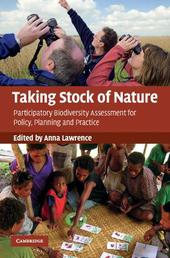
|
Taking Stock of Nature: Participatory Biodiversity Assessment for Policy, Planning and Practice
Hardback
Main Details
| Title |
Taking Stock of Nature: Participatory Biodiversity Assessment for Policy, Planning and Practice
|
| Authors and Contributors |
Edited by Anna Lawrence
|
| Physical Properties |
| Format:Hardback | | Pages:302 | | Dimensions(mm): Height 236,Width 157 |
|
| Category/Genre | Ecological science |
|---|
| ISBN/Barcode |
9780521876810
|
| Classifications | Dewey:333.9517 |
|---|
| Audience | | Professional & Vocational | |
|---|
| Illustrations |
11 Halftones, unspecified; 3 Line drawings, unspecified
|
|
Publishing Details |
| Publisher |
Cambridge University Press
|
| Imprint |
Cambridge University Press
|
| Publication Date |
18 February 2010 |
| Publication Country |
United Kingdom
|
Description
In a world of increasing demands for biodiversity information, participatory biodiversity assessment and monitoring is becoming more significant. Whilst other books have focused on methods, or links to conservation or development, this book is written particularly for policy makers and planners. Introductory chapters analyze the challenges of the approach, the global legislation context, and the significance of the Millennium Ecosystem Assessment. Specially commissioned case studies provide evidence from 17 countries, by 50 authors with expertise in both biological and social sciences. Ranging from community conservation projects in developing countries to amateur birdwatching in the UK, they describe the context, objectives, stakeholders and processes, and reflect on the success of outcomes. Rather than advocating any particular approach, the book takes a constructively critical look at the motives, experiences and outcomes of such approaches, with cross-cutting lessons to inform planning and interpretation of future participatory projects and their contribution to policy objectives.
Author Biography
Anna Lawrence has been working for nearly 20 years in participatory conservation and social forestry research. Following degrees from Cambridge and Oxford Universities, her early career in South America and Asia inspired a focus on interaction between local and scientific knowledge, and linking research to policy and practice. At the Environmental Change Institute, University of Oxford, she established and led the Human Ecology research group for seven years. After working in more than 20 countries she has recently moved to focus on issues closer to home, as Head of Social and Economic Research in the British government's Forestry Commission.
|